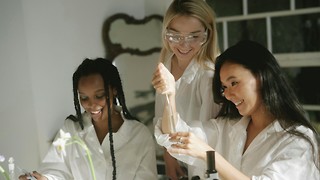Comedy: Perfect Strangers
Fred Maynard on the latest tour show from the Footlights
Stephen Fry once said that the first thing any fresher arriving at Cambridge will be told is that “apparently the Footlights are crap this year”. Any institution with as storied a history as the Footlights is designed for disappointment, year after year. John Cleese was no Peter Cook, Fry and Laurie were no Douglas Adams, Simon Bird and Joe Thomas were no Mitchell and Webb. And Perfect Strangers is no blockbusting, comedy-rules rewriting firework of comic invention. So what?
Well, there’s a question. To judge this show is not a simple case of giving a star rating against other home-grown sketch shows. It is a Cambridge show that plays most of its 85 performances outside Cambridge. As usual, no doubt, it will sell out at the Fringe, vastly outselling a hundred other comedy shows through dint of name recognition (incidentally, to any Footlights publicity people reading this, you can put that firework line on your fliers without the “no”. Yeah, journalistic integrity and everything, but I am really just a massive egotist). I must at this point ask whether it deserves to.
It is a funny show. I laughed frequently. But frequent laughs don’t necessarily equal a satisfying sketch show. Our gallant performers have run into a perennial problem with the format they have taken on: if the sketches aren’t absolutely inspired, or you don’t have a cunning thread or gimmick providing some kind of coherence, a masterclass in which was provided by the frankly superior Pick Me Up, then it can come across as unsatisfyingly piecemeal. The problem was not at all with the performers, all of whom bring a range of unique skills: Emma Powell the perfect straight-woman, Phil Wang with his droll delivery, Pierre Novellie with his genial, warm charisma (“It’s Captain Phoebus! Hooray!”), Jason Forbes with his straight face and bendy limbs, and George Potts, the very platonic ideal of a sketch actor, committing totally to each of his diverse characters with a manic intensity.
No, the problem was that the writing didn’t give them more than just funny lines. It didn’t come up with radically new ideas, didn’t provide a single monumentally funny centrepiece sketch, and most importantly didn’t overcome the first hurdle of any sketch show – final punchlines. When a sketch ends with someone simply saying that they’re a bad doctor (I think we got the message) or limply saying “I just really like dancing” there is a massive deflation of whatever comedy has come before. Frankly it’s one of the weaknesses of the format as a whole. I liked many of the ideas: a time travelling phone, an increasingly depressing Christmas round-robin – but they rarely twisted far beyond our expectations. One sketch that did – a Disney Princess sketch that had a bewildering number of turns – had me yearning for what could have been.
But this of course is not the final product – it is quite obviously 30 minutes too long, and in Edinburgh it will be 30 minutes shorter. So what needs to be done before then? It’s all plenty polished enough. What it now requires is a sense of unity –a development of the more ambitious and interesting sketch ideas, dumping the more standard ones, adding more twists to the punchlines, and finding some way, via callbacks or other devices, to link the sketches together. Given the talents of the team involved, I had expected better, but they have plenty of time to give it. They aren’t Python yet, but to be fair, Python weren’t Python at this stage either.
 News / Cambridge don appointed Reform adviser23 October 2025
News / Cambridge don appointed Reform adviser23 October 2025 Arts / Why is everybody naked?24 October 2025
Arts / Why is everybody naked?24 October 2025 Comment / On overcoming the freshers’ curse22 October 2025
Comment / On overcoming the freshers’ curse22 October 2025 Arts / Why Cambridge’s architecture never lives up to the ‘dark academia’ dream 17 October 2025
Arts / Why Cambridge’s architecture never lives up to the ‘dark academia’ dream 17 October 2025 News / How much does your college master earn?17 October 2025
News / How much does your college master earn?17 October 2025









